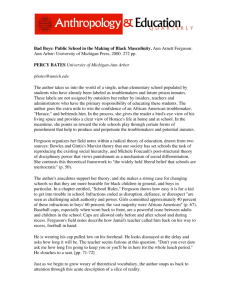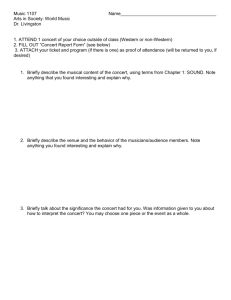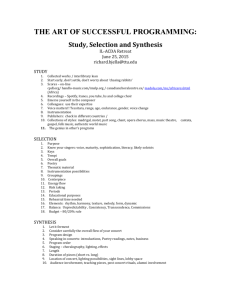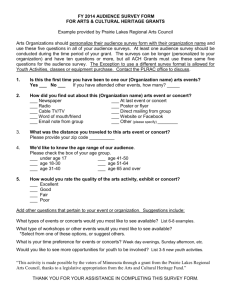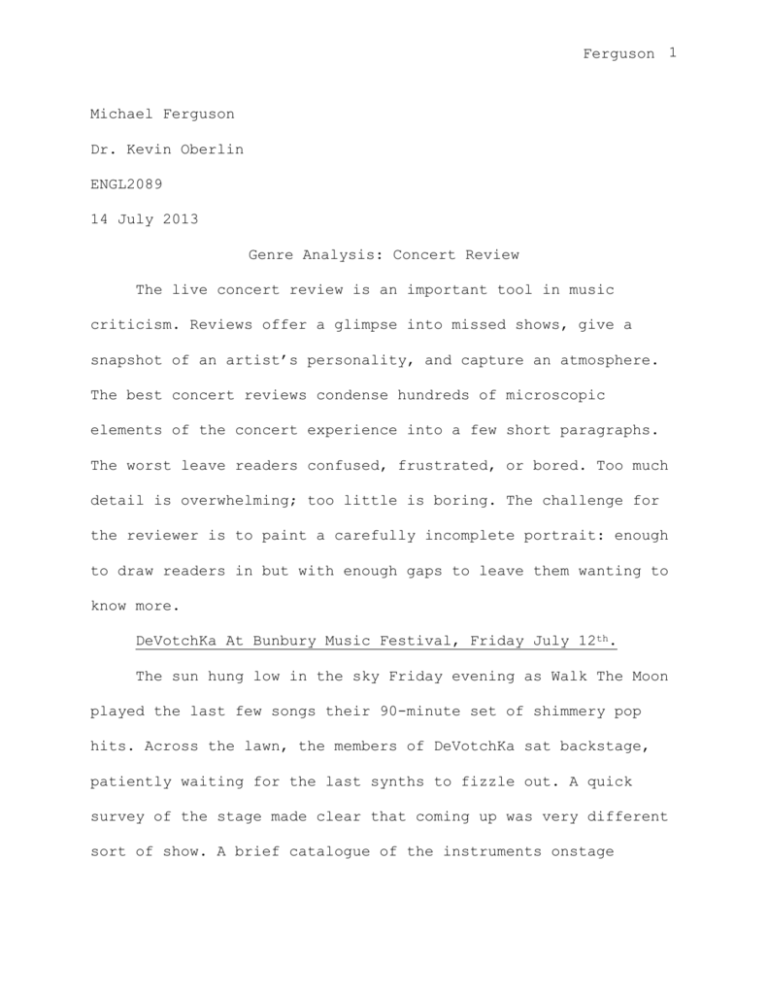
Ferguson 1
Michael Ferguson
Dr. Kevin Oberlin
ENGL2089
14 July 2013
Genre Analysis: Concert Review
The live concert review is an important tool in music
criticism. Reviews offer a glimpse into missed shows, give a
snapshot of an artist’s personality, and capture an atmosphere.
The best concert reviews condense hundreds of microscopic
elements of the concert experience into a few short paragraphs.
The worst leave readers confused, frustrated, or bored. Too much
detail is overwhelming; too little is boring. The challenge for
the reviewer is to paint a carefully incomplete portrait: enough
to draw readers in but with enough gaps to leave them wanting to
know more.
DeVotchKa At Bunbury Music Festival, Friday July 12th.
The sun hung low in the sky Friday evening as Walk The Moon
played the last few songs their 90-minute set of shimmery pop
hits. Across the lawn, the members of DeVotchKa sat backstage,
patiently waiting for the last synths to fizzle out. A quick
survey of the stage made clear that coming up was very different
sort of show. A brief catalogue of the instruments onstage
Ferguson 2
includes a violin, a sousaphone, two guitars, a trumpet, and an
accordion.
As if by careful calculation, the sun slipped below the
horizon just as DeVotchKa jogged onto the stage. A quick hello
to the crowd. Two rapid strums on a guitar. The transformation
was complete: what had been a warm summer evening just moments
before was now a hot summer night.
DeVotchKa bring a world sensibility to their passionate
brand of folk music. Frontman Nick Urata is as likely to be
wailing in Spanish as he is singing in English. The quartet
switch instruments almost every song and fill out their sound
with percussion from around the globe.
For the next hour they play through a series of their
biggest hits: Tom Hagerman’s violin prowess shows through in
“The Clockwise Witness.” Drummer Shawn King, plays a near
militaristic trumpet in “All The Sand In All the Sea.” Jeanie
Shroeder moves rapidly between sousaphone and upright bass,
dancing all the while (Loftus). But the real power behind
DeVotchKa comes from Nick Urata’s voice. Used as an instrument
in its own right, it swells up and down with uplifting
crescendos and crashing yells.
Urata speaks rather little during the set. There are
introductions here, names of songs there, but the crowd banter
Ferguson 3
is held to a minimum. In its place, he nurses a bottle of wine
between songs.
The entire setlist seems to build to one pivotal moment, a
song titled “How It Ends.” (The group gained critical success
when an instrumental version of the song appeared in the film
Little Miss Sunshine.) Layers of piano and violin accompany soft
verses about tests of faith, slowly building into a pounding
orchestral moment where Urata roars the chorus: “You already
know how this will end.” And we do. Two more songs and the
concert is over, yet the intensity of his voice, the strain of
the trumpet, the high pitched violin, and the heat of the dark
summer heat hangs on for far longer.
Analysis
Reviews of all kinds are challenging to write. Critiquing a
creative work--whether it be a book, theater production, film,
or piece of music--brings difficulties to the writing process
hat other genres do not. For instance, the reviewer must display
a deep knowledge of previous work by the artist without
appearing to be biased. An impartial tone throughout is a
necessity in reviewing work.
The live concert review, compared to book or film reviews,
brings an added later of complexity. Not only is the music
itself being reviewed; every aspect of the performance is open
Ferguson 4
to critique. The performer's banter between songs, his or her
attire, and the slightest behavioral tics onstage are all
available to the reviewer. (No book reviewer bothers to discuss
what the author was wearing when he finished the novel.) In a
lesser sense, attributes of the venue and the quality of the
sound are up for comment too. Only theater review approaches
this level of added commentary on the noncreative aspects of a
performance.
These additional details, however, are essential to the
reviewer’s craft. The task of he reviewer is to comment on the
entire experience. Album reviews discuss songs in the context of
he whole album; concert reviews discuss songs in the context of
the entire sensory experience. What is seen and felt is nearly
as important as what is heard. For instance, Ferguson discusses
the group DeVotchKa alongside the setting sun (Ferguson).
These
types of details say nothing directly about the music itself but
paint a broader picture of the concert atmosphere. They help to
frame the story and construct for the reader an idea of what it
was like to be in the audience.
Framing allows the reviewer to shape how his or her
thoughts on the show are received. The best reviews come not
from cool, distant analysis but from involved storytelling.
Readers can gain a sense that the reviewer is describing the
Ferguson 5
scene to them as an informed friend, as “genres reflect habitual
ways of communicating and behaving in various scenes” (Devitt et
al.175). In this sense, concert reviews can be seen as a form of
literary nonfiction. The performer becomes a character, the
reviewer a narrator. Dialogue is taken down, inflections noted.
In some lengthier reviews, recurring motifs or extended
metaphors are employed to tell a more compelling story. There
are multiple narrative threads to be found at any given concert.
Different reviewers pick up on different elements and can write
dramatically different narratives of the same performance.
It is from this conception of concert review as literary
nonfiction that two pieces will be examined. In the first,
SPIN's Chris Martins reviews a May 2013 performance by the
English folk singer Laura Marling. Martins employs the literary
style effectively, breaking in tone only a handful of times and
only when absolutely necessary. His prose quickly establishes
the setting, a "creepy red-lit room" (Martins). While he avoids
any description of Marling's appearance, he gives a sense of her
demeanor through his discussion of themes in her new album and
her performance: "It was heartbreaking what she did, weaving
this clause into the very fabric of what made us all fall for
her song after song. When she'd shred between words she'd throw
her head back like she wanted it to roll off her shoulders"
Ferguson 6
(Martins). Martins’ review is favorable yet impartial. He does
not shy away from noting Marling’s sparse and slightly unusual
stage dialogue: “’It’s been a pleasure,’ she said oddly, as if
she too forgot this place in a room full of others” (Martins).
The opening paragraph of his review also notes her infrequent
speech. The narrative that emerges (entirely by Martins’ design)
is one of a reserved woman more comfortable singing out than
making conversation.
In reviewing a July 2013 performance by the punk band
Savages, The New York Times’ Ben Ratliff takes a different tone.
While still operating in the literary nonfiction discourse,
Ratliff provides a fairly negative view on the concert and the
band. His review is best summed up in one sentence near the end:
“This is a band whose intellectual ambitions aren’t on the same
scale as the group’s sound” (Ratliff). This view is supported by
an analysis of the band’s origins, inspirations, and
manifestoes. He details how the group fits well into the context
of punk music from several decades ago but is unable to compete
today. Only after several paragraphs of context have been
established does he review the music itself. His descriptions of
“agitated noise” and “unsteadiness in tempo” explain his concern
about the mismatch between ambition and sound. This framing is
where the talent in Ratliff’s review shows through. A review
Ferguson 7
about a musically unimpressive concert is not necessarily poorly
written; however, such a monolithic story comes across as bland
and uninteresting. Therefore, Ratliff pairs this musical
shakiness with an exploration of the band’s ideology, setting up
context and conflict and making for a more interesting critique.
In his review of DeVotchKa at Bunbury Music Festival,
Ferguson employs many of these techniques with varying success.
The statements about the sun setting help to frame the concert
in a context of time and temperature: “what had been a warm
summer evening just moments before was now a hot summer night”
(Ferguson 1). With this context in mind, the lively energetic
atmosphere of the concert is more adequately captured than if
the review focused on the sound alone. This talk of energy is
carried through in the discussion of Urata’s voice and the other
members of the ensemble.
Ferguson is less successful in describing the context in
which DeVotchKa fall musically. No similar artists are
mentioned, nor is there a truly successful explanation of the
type of songwriting they employ. While these do not immediately
detract from the review, a stronger piece would include these
references to paint a broader picture for the reader.
Most prominently missing from the review is a single
narrative thread. There are individual moments, particularly the
Ferguson 8
first and last paragraphs that provide a sense of framing.
However, the piece as a whole does not read as particularly
unified. It is an acceptable summary of the experience, but
contains plenty of room for improvement as far as storytelling
is concerned.
One other notable absence is an image of the group
performing. Visual rhetoric of any kind adds layers of
information to music reviews, but particularly important is a
picture taken of the band as they play. A well-composed image
appropriately paired with a piece of writing can reinforce the
narrative in a powerful way. Images capture moods, facial
expressions, and action in a compelling way and the have the
potential to make a story far more meaningful than text alone.
Were the review placed online or in a print publication, an
image likely could accompany the writing. This strengthened
reading dependent on media is an important part of understanding
genres. “Writing morphs and changes meaning as it moves from one
medium or genre or rhetorical situation to another” (Losh et al.
261). This explains why reviews in print take on a different
meaning than reviews online. Concert reviews posted online get
the benefit of embedding links, audio, and video into a piece
where print cannot. This difference in medium dictates a
difference in writing.
Ferguson 9
Experience in reviewing also dictates a change in writing.
Those with more experience to draw from are usually better able
to describe what unfolds before them and craft a compelling
narrative: “Writers who can successfully manipulate an audience
are writers who can both imagine and write from a position of
privilege” (Bartholomae 515). The privilege, in this instance,
is familiarity with the genre.
Ferguson 10
Works Cited
Bartholomae, David. "Inventing The University." Literacy: A
Critical Sourcebook. Ed. Ellen Cushman, Eugene R. Kintgen,
Barry M. Kroll, and Mike Rose. Boston: Bedford/St.
Martin's, 2001. 511-524. Print.
Devitt, Amy J., Mary Jo. Reiff, and Anis S. Bawarshi. Scenes of
Writing: Strategies for Composing with Genres. New York:
Pearson/Longman, 2004. Print.
Ferguson, Michael. “DeVotchKa At Bunbury Music Festival, July
12th 2013.” Unpublished essay. 2013.
Loftus, Johnny. "About DeVotchKa." MTV Artists. Web. 13 July
2013.
Losh, Elizabeth, Jonathan Alexander, Kevin Cannon, and Zander
Cannon. "Going Public" Understanding Rhetoric: A Graphic
Guide To Writing. Boston: Bedford/St. Martin's, 2013. 245266. Print.
Martins, Chris. "Laura Marling Enchants L.A.'s Hollywood Forever
Cemetery With Songs Of Loss And Beauty." SPIN. 22 May 2013.
Web. 13 July 2013.
Ratliff, Ben. "Gender Roles, Manifestoes, And Sounds Of A
Certain Era." The New York Times.
July 2013.
12 July 2013. Web. 13
Ferguson 11

